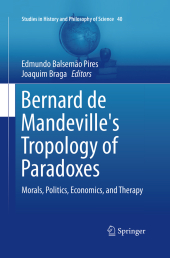 Neuerscheinungen 2016Stand: 2020-02-01 |
Schnellsuche
ISBN/Stichwort/Autor
|
Herderstraße 10
10625 Berlin
Tel.: 030 315 714 16
Fax 030 315 714 14
info@buchspektrum.de |

Edmundo BalsemĈo Pires, Joaquim Braga
(Beteiligte)
Bernard de Mandeville´s Tropology of Paradoxes
Morals, Politics, Economics, and Therapy
Herausgegeben von BalsemĈo Pires, Edmundo; Braga, Joaquim
Softcover reprint of the original 1st ed. 2015. 2016. x, 264 S. 235 mm
Verlag/Jahr: SPRINGER, BERLIN; SPRINGER INTERNATIONAL PUBLISHING 2016
ISBN: 3-319-36634-3 (3319366343)
Neue ISBN: 978-3-319-36634-0 (9783319366340)
Preis und Lieferzeit: Bitte klicken
This book integrates studies on the thought of Bernard de Mandeville and other philosophers and historians of Modern Thought. The chapters reflect a rethinking of Mandeville´s legacy and, together, present a comprehensive approach to Mandeville´s work. The book is published on the occasion of the 300 years that have passed since the publication of the Fable of the Bees. Bernard de Mandeville disassembled the dichotomies of traditional moral thinking to show that the outcomes of the social action emerge as new, non-intentional effects from the combination of moral opposites, vice and virtue, in such a form that they lose their moral significance. The work of this great writer, philosopher and physician is interwoven with an awareness of the paradoxical nature of modern society and the challenges that this recognition brings to an adequate perspective on the historical world of modernity.
Chapter 1: "Men Become Sociable by Living Together in Society": Re-assessing Mandeville´s Social Theory; Malcolm Jack.- Chapter 2: Bernard de Mandeville and the Shaping of Conjectural History; Frank Palmeri.- Chapter 3: Mandeville and the Eighteenth-Century Discussions about Luxury; Edmundo BalsemĈo Pires.- Chapter 4: Sex, Money, and Feelings: Mandeville´s Dialogue with Sentimental Drama; Laura J. Rosenthal.- Chapter 5: Humorism a Posteriori: Fables and Dialogues as a Method in Mandeville´s Thought; Alessandro Chiessi.- Chapter 6: Mandeville, Pope, and Apocalypse; Peter Knox-Shaw.- Chapter 7: The Fable of the Bees: proles sine matre? Béatrice Guion.- Chapter 8: Mandeville as a Skeptical and Medical Philosopher; Rui Bertrand RomĈo.- Chapter 9: Is Adam Smith Heir of Bernard Mandeville? Isil esmeli.- Chapter 10: Mandeville on Pride and Animal Nature; John J. Callanan.- Chapter 11: "Remarks upon that wonderful chapter": The Controversy on Luxury between Mandeville and Dennis; Matteo Revolti.- Chapter 12: Mandeville and the Therapeutics of Melancholic Passions; Cláudio Alexandre S. Carvalho.- Chapter 13: Mandeville´s Letter to Dion (1732) as an Answer to Berkeley´s Alciphron (1732); Mikko Tolonen.- Chapter 14: Mandeville and the Markets: An Economic Assessment; Rogério Arthmar.- Chapter 15: Courage and Chastity in a Commercial Society: Mandeville´s Point on Male and Female Honour; Andrea Branchi.- Chapter 16: Mandeville and Smith on the Problem of Moral Order; Luís Oliveira.- Chapter 17: Atheism, Religion and Society in Mandeville´s Thought; Mauro Simonazzi.- Chapter 18: Simulation and Dissimulation: Mandeville´s Satirical View of Commercial Society; Joaquim Braga.
Edmundo BalsemĈo is Professor of Philosophy at the University of Coimbra. He graduated from the University of Coimbra, in Philosophy (1986). He has a Master degree in Contemporary Philosophy, obtained in 1990 with a thesis on Emmanuel Levinas, and a Ph. D. with a dissertation on Hegel´s Political Philosophy (1999). He studied at the Ruhr-Universität Bochum (Hegel-Archiv) during a research year conducing to the Ph. D., as a DAAD fellow. He wrote Povo, Eticidade e RazĈo - Contributos para o estudo da Filosofia Política de Hegel in two volumes (Lisboa, Imprensa Nacional - Casa da Moeda, 2006), A IndividuaĈo da Sociedade Moderna (Coimbra, Imprensa da Universidade de Coimbra, 2011) and edited Public Spaces, Power and Communication (Porto, 2007), Still Reading Hegel (Coimbra, 2009), Relations of the Self (Coimbra, 2010). He has also published many articles in specialized Journals, in Portugal and abroad and edited issues of academic Journals with international circulation.Joaquim Braga is FCT-Postdoctoral Research Fellow at the Department of Philosophy of University of Coimbra, and member of the research group "Individuation of the Modern Society", R&D LIF - Language, Interpretation, Philosophy. He is graduated in philosophy at the Faculty of Letters of the University of Coimbra. In 2010, he finished his PhD at Humboldt University of Berlin, with a thesis based on the philosophy of Ernst Cassirer. His current fields of research cover Picture Theory, Aesthetics, Philosophy of Culture and Modern Philosophy, with a special interest in symbolic thought. His works include, among others, Die symbolische Prägnanz des Bildes. Zu einer Kritik des Bildbegriffs nach der Philosophie Ernst Cassirers (Freiburg, 2012), Rethinking Culture and Cultural Analysis - Neudenken von Kultur und Kulturanalyse (together with Christian Möckel, Berlin, 2013).


